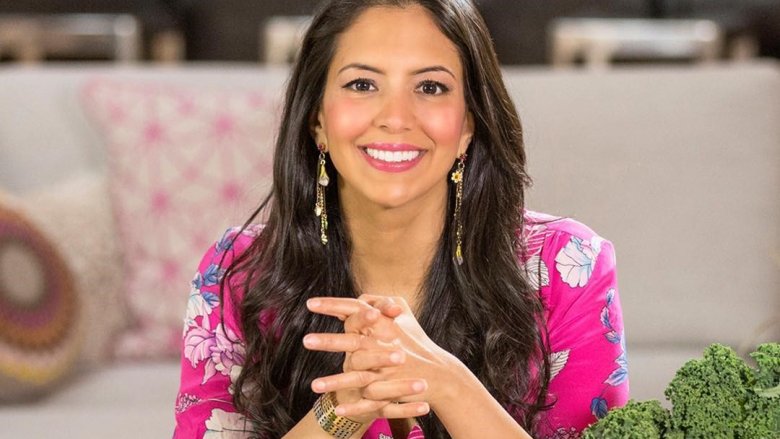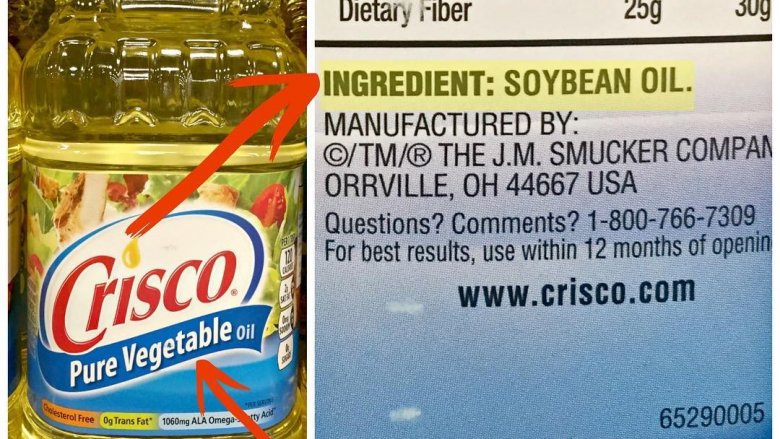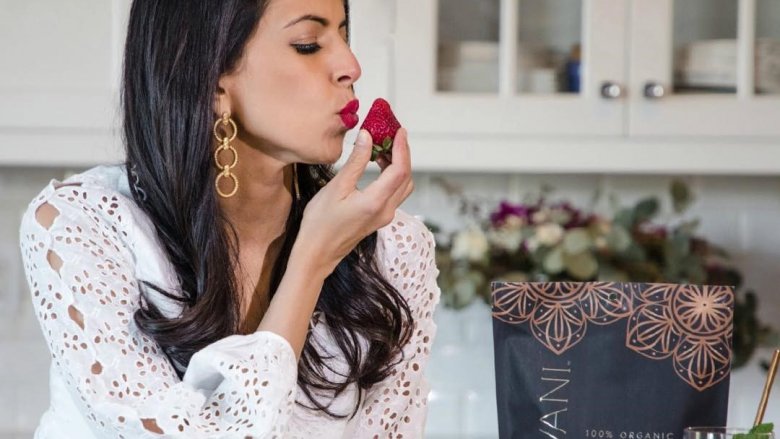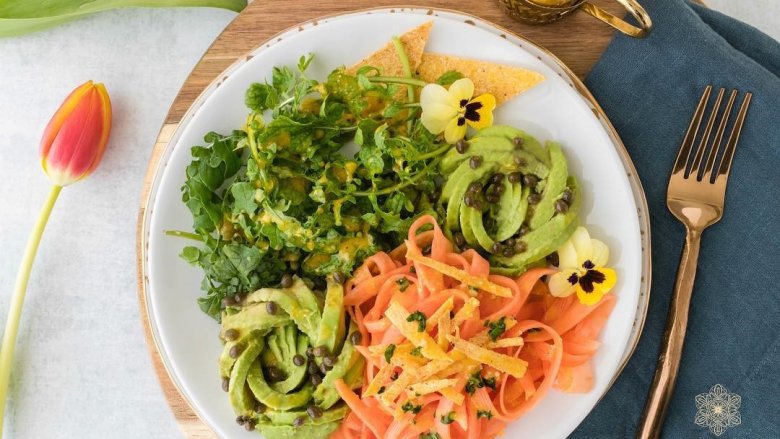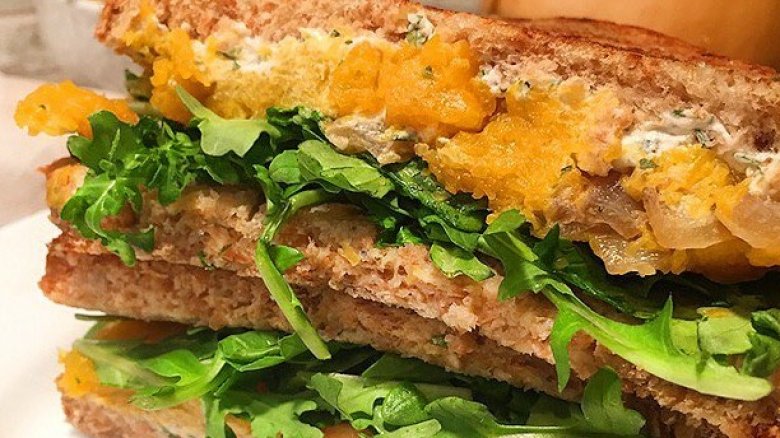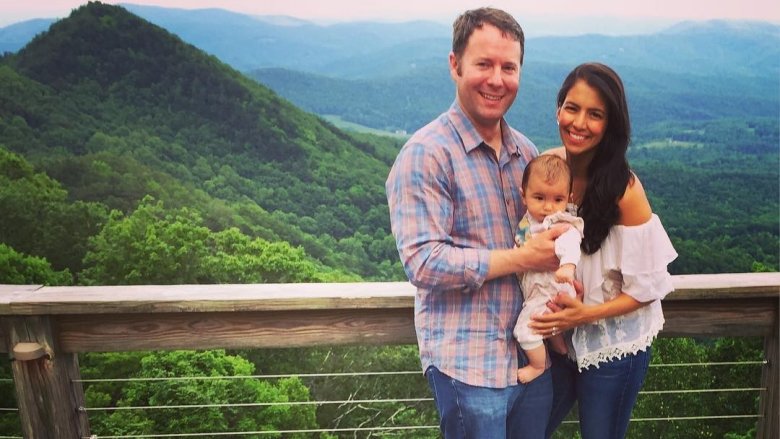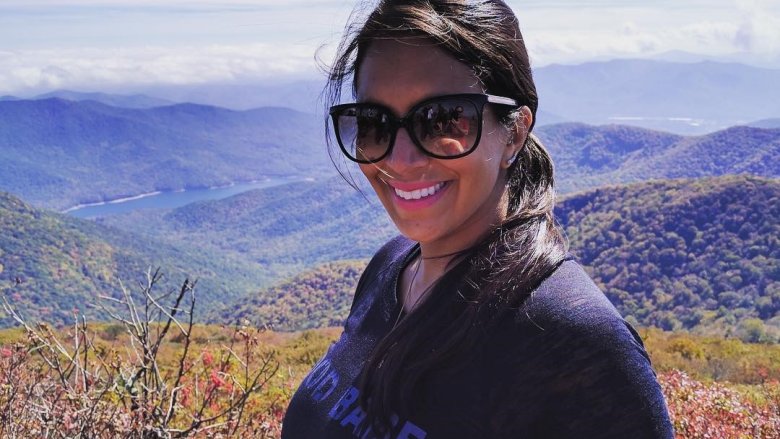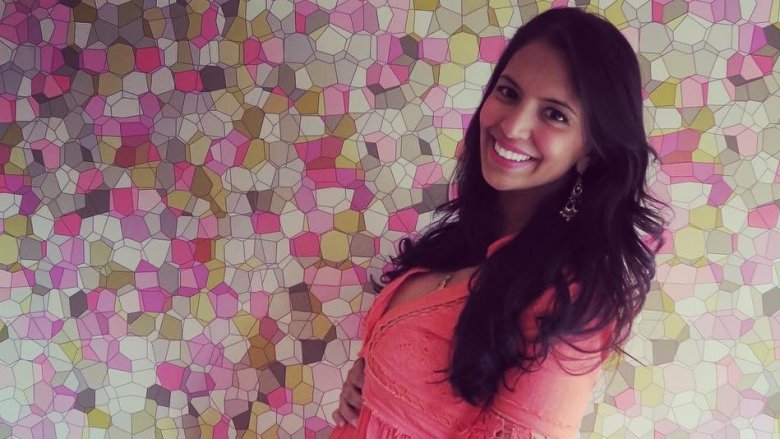Things Food Babe Doesn't Want You To Know
Vani Hari decided to transform herself into the self-styled "Food Babe" after, she says, her poor diet and unhealthy lifestyle landed her in the hospital. Now, she's leading a crusade to get others to clean up their lifestyle, and started a blog in 2011. She's attracted scores of followers called the Food Babe Army, but she's attracted a ton of critics, too.
Hari is deeply polarizing, and while some people who follow her believe she's doing an amazing thing and helping them make their lives better, others condemn her for being an alarmist who's spouting nothing more than a load of pseudo-scientific baloney. There's not a whole heck of a lot of people on the fence about her, but her rise to fame — and her mission statement — is still a fascinating look at some of the strangest corners of the modern-day food industry. She's proof that anyone can do anything, and if you've ever wondered just what she's all about, let's talk about the stuff she probably wishes we didn't know about her.
She has no background in food or chemistry
Hari calls herself "a revolutionary food activist," is a New York Times best selling author, and was named one of the "Most Influential People On The Internet by Time magazine in 2015" (via Food Babe). What she doesn't call herself is someone with any kind of background in food science or chemistry, because she doesn't have any credentials or education to really back up her work.
The Genetic Literacy Project did a focus article on her resume, noting that her degree is in computer science and her previous work experience is in banking and information security. Her food blogging started in 2002, when she was also acting as a senior consultant for a consulting firm called Accenture. While she was getting the blog off the ground, she worked for Bank of America, Wachovia Corporate Investment Bank, Ally Financial, and was a panelist on the Charlotte Society of Professional Journalism. None of that involves the foodie topics she claims to be an expert on now, and that hasn't gone unnoticed by her biggest critics.
The Food Babe hasn't denied her lack of credentials, and argues that they don't make her any less qualified. "In the same way you don't need to be a doctor to know smoking causes cancer, you don't need to have any credentials to read an ingredient label, research food ingredients, teach yourself what to eat or how to take care of your health," she said on her blog.
She's hawked products containing ingredients she's hated on
Hari isn't just doing all this out of the goodness of her heart. As the Genetic Literacy Project points out, she's sponsored by a slew of advertisers pushing all-natural, organic, and alternative health products. Anyone with a passing knowledge of her advocacy knows she regularly condemns any ingredients that sound even vaguely scientific, but she's been caught selling some of the products she condemns on her website.
While her "New Products That Make Me Scream In Excitement" post has a ton of content about all-natural and completely safe products, Bad Science Debunked points out that one of the products she's screaming about — Piggy Paint nail polish — contains neem oil linked to the deaths of at least 10 children. They also contain some of the D&C coal tar dyes she says causes cancer and brain toxicity.
Bad Science Debunked has also pointed out she's selling spices that contain ingredients she's condemned as carcinogenic, and Skeptical Inquirer says she's also selling deodorant and skin care products containing ingredients she claims are dangerous. Many of her claims about those ingredients have been debunked repeatedly, but she's still profiting from selling something she preaches against. Legit, or no?
She's given some potentially deadly advice
One of the things Hari has been vocal in condemning is the flu shot, saying that it's filled with "toxic chemicals and additives that lead to several types of cancers and Alzheimer disease over time." She says she won't put them on her body, much less eat them or inject them, citing evidence from an unnamed "very famous immunologist & geneticist" as reason enough to skip the annual flu shot.
Hari says it's up to every individual to decide whether or not they get a flu shot, but there's no question as to whether or not she'll be getting it. There's a problem, though: Not getting a flu shot can be a potentially deadly decision. According to the CDC, the vaccine prevented around 5.3 million illnesses and 85,000 hospitalizations during the 2016-2017 flu season. Flu shots lowered the chances of someone ending up in intensive care by 82 percent, and they estimate the flu has caused — directly or indirectly — as many as 56,000 deaths during the 2012-2013 flu season. Children and the elderly are most at risk, and that makes Hari's advice potentially deadly.
She took down her microwave post
In 2012, Hari made headlines with a super-bizarre post condemning one of the devices almost everyone has in their kitchen: the microwave. She took down the post, but fortunately, the internet never forgets and Science 2.0 preserved it for posterity.
She made some claims that were so strange it left even faithful readers shaking their heads. She included things like the idea that microwaves "create carcinogenic compounds in your food," that there's a link between microwave use and obesity, and that microwaves create "dead" food.
Other claims in her article have been debunked, like the idea that microwaves give off deadly radiation. The American Cancer Society says that not only do microwaves only give off radiation when they're on and closed, but that they're definitely well-contained. Then there's her claims that microwaving destroys nutrients, which is the exact opposite of true. According to research from the University of Murcia, microwaving is one of the best ways to cook veggies, and results in lower nutrient loss than boiling. Later, she admitted the post "was not my most impressive piece of work," but didn't admit it was largely false.
She's fear-mongered air travel, too
Whenever you read something Food Babe condemns as dangerous, remember that she's made some wild claims about just what happens when you're in an airplane, too. Her air travel post from 2011 has also been removed from her official site, but that one has also been saved for posterity by Science 2.0. Among the claims are that planes compress your body and your organs to the point where everything starts to shrink, and that you're breathing air that contains jet fuel, since it's pumped directly into the plane from near the engines. She also says you might be sprayed with pesticide before you get on, and the air is actually as much as much as 50 percent nitrogen. Oh — and that you should sit near the front, because the pilots get better air.
None of that works the way she thinks it does, and Neurologica disputed every bit of information in the article except one: the well-known fact you should move around instead of staying seated for hours on end, and that goes for life on the ground, too. She later said she "made a mistake about oxygen inside airplanes," (though she didn't explain that the Earth's atmosphere is actually 78 percent nitrogen) while not acknowledging all the other incorrect information on the post.
She's tight-lipped when it comes to financials
In theory, someone crusading for the best interests of mankind shouldn't have a financial stake in what they're doing — that's the point of non-profits, after all. Food Babe definitely isn't a non-profit, and while she says "you can't buy my likeness, my logo or my endorsement," she certainly sells it a lot.
Adage asked the question, "Activist or Capitalist?" when they looked at just how she makes her money, and they found she's pretty secretive about what money changes hands behind the scenes of her blog. They note that she's a huge proponent of not only eating cleanly, but of affiliate marketing. That's where she promotes a company or product, sends her readers to their site to buy something, and then gets a cut of all the purchases. A lot of bloggers do that, but Adage says the problem comes in when she doesn't have the credentials to back up the medical and health advice she's giving, and instead says, "I don't think you need to have those degrees to be intellectually honest."
Her crusade against the yoga mat chemical was probably pointless
There are a lot of people who first heard Hari's name in conjunction with her crusade against Subway and her petition to remove what was quickly dubbed the "yoga mat chemical" from their bread. It's actually called azodicarbonamide, and admittedly, it sounds pretty scary. Only... it's not, and her crusade was probably completely pointless.
Hari claims it's so bad that it's banned in many countries, but that's not the whole story. Researchers over at Neurologica — who called her crusade "the worst example of pseudoscientific fearmongering" they'd seen in a while — say it's actually banned not because it's dangerous when it's used in a product, but because it's potentially dangerous to factory workers who are being directly exposed to the aerosolized chemical. The World Health Organization and the US Food & Drug Administration both say it's completely safe to use in food, partially because when it's used in things like bread, it completely breaks down during the manufacturing process. And that means you're not even eating it — you're eating the chemicals it breaks down into, which have also been deemed safe.
Hari's critics use this as a perfect example of how the Food Babe can be dangerous, saying she takes partial truths, presents them in the most headline-grabbing way possible, and doesn't give the rest of the story.
She was horribly wrong about raw milk
Hari has also given some potentially dangerous advice when she posted about organic milk and dairy products. While she touted the benefits of organic dairy, she also said the very best way to drink milk is raw. That's to say unpasteurized, and there's a huge problem with that. She calls raw milk "alive," and it absolutely is... with bacteria and potentially with E.coli.
There's a reason The Royal Society named pasteurized milk one of the most significant advances and inventions in the history of food and drink, ranking it up there with refrigeration and the tin can. Pasteurized milk is heated, and that kills off all the bacteria in it — things like E. coli, listeria, and campylobacter. Almost everyone knows this, but less well-known is that raw milk is so potentially dangerous it's illegal to sell it in 18 states. Mother Jones did some digging, and found hundreds of people have been hospitalized after drinking raw milk, some suffering kidney failure and paralysis that's permanent. So while it's definitely "alive," taking her advice and drinking it could leave you with a lifelong disability.
Her post defending herself starts off with a well-known error
The Food Babe is well aware of her critics, and has an entire post on her blog dedicated to rallying her army behind her. She kicks it off with this quote: "First they ignore you, then they laugh at you, then they fight you, then you win," and attributes it to Mahatma Gandhi. A noble sentiment and an excellent rallying cry, for sure... but Gandhi never said it.
Snopes says various sources have been trying to debunk this as a quote from Gandhi since at least 2011, and says that while the sentiment behind it is lifted from Gandhi's writings, the quote is actually a version of something said in 1914 (or 1918, depending on the source). Politifact says the speech was made at the biennial convention of the Amalgamated Clothing Workers of America, and union leader Nicholas Klein actually said, "First they ignore you. Then they ridicule you. And then they attack you and want to burn you. And then they build monuments to you."
Hari isn't the only one who has misused the quote. It's been used by Donald Trump, Hillary Clinton, Sarah Palin, Bernie Sanders... the list goes on and on, but doesn't include Gandhi.
There are actual terms for what she's doing
There are a few terms her critics have used to describe what she's doing, and Forbes says one is called quackmail.
It's essentially a blog post or email where something completely innocent is given a dark twist to cause a bit of panic. They use the example of her condemnation of big beer's use of "fish swim bladders." That's sort of true — it's called isinglass, it's dried fish bladder, it's been used in alcohol production for centuries, and there's no reason it shouldn't be used. Quackmail tells only the first part of the story, and she uses the technique a lot.
There's also chemophobia, which University of Cambridge professor James Kennedy says (via Aeon) is essentially another fearmongering tactic that suggests anything that sounds chemical is dangerous. Nothing is farther from the truth, and he uses chemicals like phylloquinone, stearic acid, and isoleucine as proof. What do they have in common? They're all ingredients that make up a banana, and no one thinks bananas are dangerous. He also points out that there are plenty of natural things that are dangerous — feeding a baby honey is potentially deadly — so it's definitely not as clear-cut as her "artificial=bad, natural=good" mantra.
Her critics don't pull any punches
Hari has some serious, heavy-hitting scientists and industry professionals who condemn her for her activism. Yale neuroscientist and pseudoscience expert Steve Novella has called her (via NPR) the "Jenny McCarthy of food," and cancer surgeon David Gorski has explained why companies fold to her demands rather than fight: "It's far easier to give a blackmailer like Hari what she wants than try to resist or to counter her propaganda by educating the public."
And then there's the SciBabe, a blog started to debunk claims of Hari's and other pseudoscientific activists. The face behind that blog is Yvette d'Entremont, a former analytical chemist with degrees in theater, chemistry, and forensic science. She took aim at Hari's pseudoscience in a 2015 piece that went viral, when she called her "the worst assault on science on the internet."
Those are strong words, and d'Entremont backs them up by debunking some of her biggest claims by pointing out some basic science facts. She also takes on Hari's rallying cry: "If a third grader can't pronounce it, don't eat it."
Her response? "My rule? Don't base your diet on the pronunciation skills of an eight-year-old."
